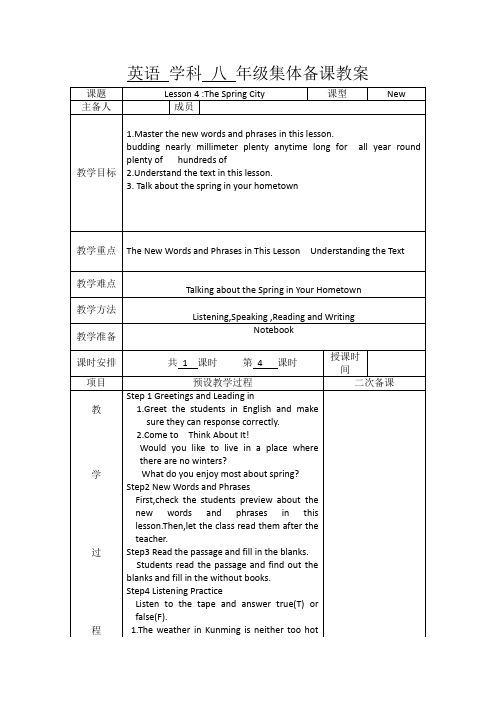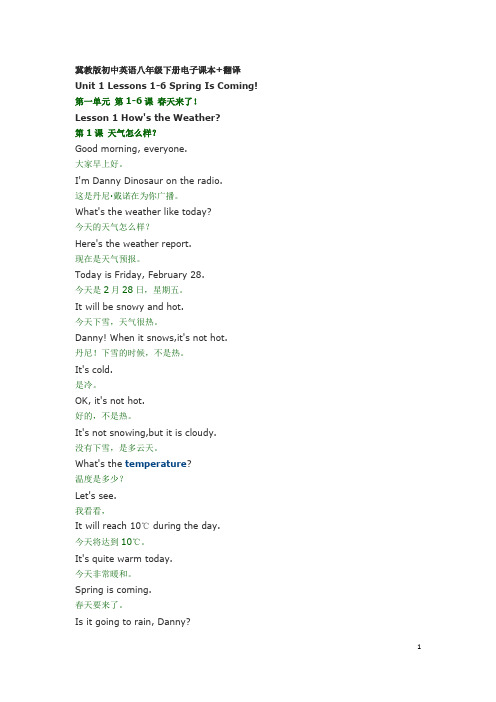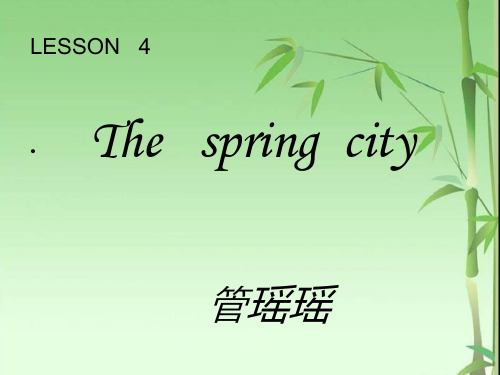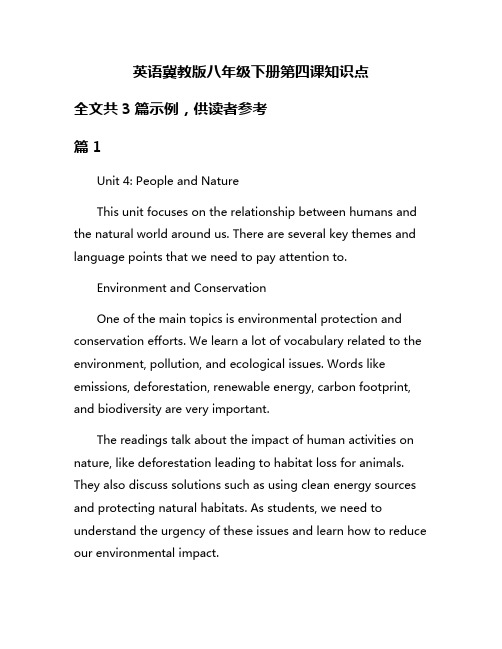八年级英语下册Lesson4教材内容详解冀教版
- 格式:doc
- 大小:103.50 KB
- 文档页数:5


冀教版初中英语八年级下册电子课本+翻译Unit 1 Lessons 1-6 Spring Is Coming!第一单元第1-6课春天来了!Lesson 1 How's the Weather?第1课天气怎么样?Good morning, everyone.大家早上好。
I'm Danny Dinosaur on the radio.这是丹尼·戴诺在为你广播。
What's the weather like today?今天的天气怎么样?Here's the weather report.现在是天气预报。
Today is Friday, February 28.今天是2月28日,星期五。
It will be snowy and hot.今天下雪,天气很热。
Danny! When it snows,it's not hot.丹尼!下雪的时候,不是热。
It's cold.是冷。
OK, it's not hot.好的,不是热。
It's not snowing,but it is cloudy.没有下雪,是多云天。
What's the temperature?温度是多少?Let's see.我看看,It will reach 10℃ during the day.今天将达到10℃。
It's quite warm today.今天非常暖和。
Spring is coming.春天要来了。
Is it going to rain, Danny?丹尼,是要下雨了吗?Yes!There will be a shower this afternoon.是的!今天下午会有雨。
Maybe there will be a thunderstorm.可能会有暴风雨。
I hope not!I'm scared of thunder!我希望没有!我害怕打雷!Wow! What strange weather!哇!这么奇怪的天气!Now talk about the sunrise and the sunset.现在说是太阳升起和落山的时间吧。



冀教版英语八年级下册Unit4课文原文及翻译中英对照版Lesson 19 How Do You Use the Internet?你们怎么使用网络?How does the Interent help you,class?同学们,网络怎么帮助你们呢?I like to use the Internet to read about sports and technology.我喜欢用网络阅读体育和科技。
With the Internet, we can learn about almost anything.有了网络,我们可以学习更多的东西。
I used to have a desktop computer,but now I have a tablet.我过去有一个台式机,现在我有了一个平板。
It has no keyboard or mouse,so it is easy to carry.它不需要键盘或鼠标,所以拿起来很方便。
Now I can use the Internet anywhere!现在我随处可用网络了!I like chatting with my friends online.我喜欢和朋友在线聊天。
We use video chat!我们使用视频聊天!I use the Internet to blog about donuts.我用网络来写多纳圈的博客。
There are 500 people following my blog!我的博客有500个关注者!Some of us are planning to organize a Donut Club.我们中的一些人计划组织多纳圈俱乐部。
If we want to have a meeting,I can send the invitation online.如果我们想组织聚会,我可以在网上发布邀请。
It’s quick and easy.很方便快捷。


八下英语第四课翻译冀教版Lesson 4 The Spring City第4课春城When we think of spring,想起春天,we think of sea son of fine warm weather and clear fresh air.我们就会想到一个美好而温暖的季节,有着干净清新的空气。
We think of new life green plants and budding trees all around us. 想到新生活,有绿色的植物,萌芽的小树围绕我们。
Every one longs for spring每个人都渴望春天。
Spring is a short season in many places around the world春天在世界上很多地方都是一个短暂的季节。
But in my hometown, it feels like spring nearly all year round.但是在我的家乡,似乎一年四季都是春天。
The weather here is neither too hot nor too cold这儿的气候不是太热也不是太冷。
The average winter temperature is 15°C冬天的平均气温是15°C。
In summer it never gets too hot在夏天,它从不会太热。
The average temperature is 24°C平均气温是24℃。
The city gets about 1 000 millimeters of rain every year这个城市的年降水量大约是1000毫米。
There's plenty of sun shine too,这儿还有充足的阳光。
with about 2250 hours of sunshine every year每年的日照时间大约2250小时。



英语冀教版八年级下册第四课知识点全文共3篇示例,供读者参考篇1Unit 4: People and NatureThis unit focuses on the relationship between humans and the natural world around us. There are several key themes and language points that we need to pay attention to.Environment and ConservationOne of the main topics is environmental protection and conservation efforts. We learn a lot of vocabulary related to the environment, pollution, and ecological issues. Words like emissions, deforestation, renewable energy, carbon footprint, and biodiversity are very important.The readings talk about the impact of human activities on nature, like deforestation leading to habitat loss for animals. They also discuss solutions such as using clean energy sources and protecting natural habitats. As students, we need to understand the urgency of these issues and learn how to reduce our environmental impact.There are also several examples of people and organizations working towards conservation goals which is quite inspiring. The Great Green Wall initiative in Africa aims to fight desertification by planting trees across the continent. Closer to home, we read about volunteers in our own province removing trash from rivers and beaches.Animals and Their BehaviorAnother focus is on different animal species and their unique behaviors. We learn fascinating facts about how animals adapt to their environments and interact with one another. From the complex social structures of elephants to the intricate construction of bird nests, the readings give us a glimpse into the incredible diversity of life on our planet.The unit also touches upon the dangers facing many species due to human activities and habitat loss. Understanding animal behavior can help us better protect vulnerable populations. Key vocabulary in this area includes terms like migration patterns, adaptation, camouflage, and endangered species.In the listening exercises, we hear people describing their encounters with animals in the wild which really brings these topics to life. Overall, this section aims to foster a sense of appreciation for the natural world and its inhabitants.Language PointsOf course, we cannot forget about the important language skills we need to master as well. There is a big emphasis on using descriptive language, especially related to nature. We learn how to construct vivid descriptions using adjectives, adverbs, and figurative devices like metaphors and personification.Comparing and contrasting is another recurring skill, such as discussing the similarities and differences between plant/animal species or different environmental issues. We need to link our ideas using appropriate transitional words and phrases.Finally, many of the readings are persuasive in nature, encouraging us to take action on environmental matters. We analyze the structure of these arguments and practice using persuasive language techniques like rhetorical questions, repetition, and emotive appeals.My ThoughtsOn a personal note, I find this unit incredibly relevant and important for our generation. Climate change and loss of biodiversity are some of the biggest challenges we will face. Learning about these topics from a young age will help shape our values and priorities as we grow older.While the facts can sometimes be distressing, I am inspired by the examples of people fighting to protect nature, whether it is an individual reducing plastic use or large-scale conservation projects. It shows that every action, no matter how small, can create positive change.I hope that my classmates and I can take these lessons to heart. Developing a love and respect for the natural world is crucial. We are inheriting this planet, so it is our responsibility to be good stewards of the environment. With knowledge and collective action, we can work towards a more sustainable future.篇2Unit 4: A Beautiful JourneyHey there! It's me again, your friendly neighborhood student, here to share my thoughts and notes on Unit 4 of our English textbook. Get ready for a wild ride as we embark on a "Beautiful Journey" through the world of language and culture!The unit kicks off with an engaging text titled "The Silk Road," which takes us on a captivating historical adventure. We learn about the incredible network of trade routes that connected the East and West, facilitating the exchange of goods, ideas, and cultures. From China to the Mediterranean, merchantsbraved treacherous terrains and hostile environments to transport precious commodities like silk, spices, and knowledge.One fascinating aspect we explored was the role of languages along the Silk Road. With so many diverse civilizations interacting, the need for effective communication became paramount. Imagine trying to strike a deal with a merchant from Persia while you only spoke Chinese! That's where the concept of a "lingua franca" comes into play – a common language used for trade and diplomacy. It's incredible to think that ancient traders were essentially multilingual negotiators!Moving on, we delved into the world of idioms and their cultural significance. Who knew that simple phrases like "let the cat out of the bag" or "a piece of cake" could have such intriguing origins? Learning idioms not only enriches our language skills but also provides a window into the customs and thought processes of different societies. It's like unlocking hidden cultural codes!But wait, there's more! The unit also introduced us to the art of storytelling and its role in preserving cultural heritage. We explored folktales and legends from various regions, each one offering a unique glimpse into the values, beliefs, and traditions of its people. From the clever trickster tales of West Africa to theenchanting myths of ancient Greece, these stories captivated our imaginations and sparked discussions about universal themes like courage, wisdom, and the triumph of good over evil.Speaking of themes, one concept that really resonated with me was the idea of cultural diversity and its importance in fostering understanding and harmony. We discussed how embracing different perspectives and acknowledging the richness of cultural expressions can lead to personal growth and a more inclusive society. It's a valuable lesson that extends far beyond the classroom walls.But let's not forget the linguistic gems we encountered along the way! We learned about the fascinating world of word formation, where seemingly unrelated words can share a common root or affix. Who knew that words like "automobile" and "biography" were essentially cousins in the linguistic family tree? It's like discovering hidden connections between seemingly disparate concepts.And let's not overlook the importance of mastering writing skills! We honed our abilities to craft well-structured paragraphs, use transitional devices effectively, and develop coherent arguments. These essential tools will undoubtedly proveinvaluable as we navigate the academic and professional realms in the future.Overall, Unit 4 was an absolute whirlwind of cultural exploration, linguistic adventures, and personal growth. From unraveling the mysteries of idioms to tracing the footsteps of ancient traders, we embarked on a journey that expanded our horizons and deepened our appreciation for the diversity that enriches our world.So, there you have it – a student's perspective on the key points from Unit 4 of our English textbook. I hope this little excursion has left you feeling inspired and eager to embark on your own "beautiful journey" of language learning and cultural discovery!篇3Unit 4 - A Brighter FutureHey there, fellow students! In this essay, I'll be breaking down the main ideas and grammar points we covered in Unit 4 of our English textbook. Get ready to dive into some fascinating topics and brush up on those language skills!The unit kicked off with a thought-provoking text about the impact of technology on our lives. We learned about both thepositive and negative effects of technological advancements. On one hand, technology has made our lives more convenient and efficient. We can now access information, communicate, and accomplish tasks with just a few taps on our devices. However, the text also highlighted the potential downsides, such as the risk of becoming overly reliant on technology and the potential negative impact on our social skills and face-to-face interactions.One of the key grammar points we studied was the use of the present perfect continuous tense. This tense is used to describe actions that started in the past and are still ongoing in the present. For example, "I have been learning English for five years." We practiced using this tense in various contexts, such as discussing our hobbies, habits, and personal experiences.Moving on, we explored the fascinating world of artificial intelligence (AI) and its potential to revolutionize various industries. We learned about the incredible capabilities of AI systems, such as their ability to process vast amounts of data, recognize patterns, and make predictions. At the same time, we also discussed the ethical concerns surrounding AI, such as the potential for job displacement and the need for responsible development and regulation.In our grammar lessons, we delved into the use of the future continuous tense. This tense is used to describe actions that will be in progress at a specific time in the future. For instance, "At this time next week, I will be taking my English exam." We practiced forming and using this tense in various contexts, such as discussing future plans, making predictions, and expressing expectations.Another fascinating topic we covered was the concept of a "smart city." We learned about the integration of advanced technologies, such as sensors, data analytics, and Internet of Things (IoT) devices, to improve urban infrastructure, services, and quality of life. From efficient traffic management to optimized energy usage and improved public safety, the possibilities of smart cities are truly exciting.In terms of grammar, we focused on the use of the present perfect tense. This tense is used to describe completed actions in the past, with a connection to the present. For example, "I have finished my homework." We practiced using this tense in various contexts, such as discussing achievements, experiences, and ongoing situations.Finally, we explored the idea of sustainable development and the importance of finding a balance between economicgrowth and environmental protection. We discussed the challenges posed by climate change, resource depletion, and pollution, as well as the potential solutions offered by renewable energy sources, eco-friendly technologies, and responsible consumption habits.In our grammar lessons, we revisited the use of modal verbs, such as "should," "must," and "could." These verbs are used to express obligation, possibility, and advice. For instance, "We should recycle more to reduce waste." We practiced using modal verbs in various contexts, such as discussing environmental issues, making suggestions, and expressing opinions.Throughout the unit, we also had the opportunity to enhance our reading, writing, listening, and speaking skills through a variety of engaging activities and exercises. We analyzed texts, participated in discussions, wrote essays, and practiced our pronunciation and fluency.Overall, Unit 4 was an insightful and thought-provoking journey. We explored fascinating topics related to technology, AI, smart cities, and sustainable development, while also strengthening our grammar skills and language proficiency. As we move forward, let's continue to embrace the power ofknowledge and language to understand the world around us and shape a brighter future for all.。




Lesson 4:Sun Is Rising太阳在升起◆课文英汉对照Sun is rising,太阳在升起,Spring is ing,春天来了,Snow is melting,雪在融化,e with me.跟我来吧。
Climb the hillside,爬上山丘,Weather is warming,天气变暖,Wind blows gentlyThrough the trees.风轻轻地吹过树林。
One by oneThe flowers blossom, 花一朵一朵地绽放,Enjoy them one by one. 一个一个地欣赏着它们。
Sun is rising,太阳在升起,Spring is ing,春天来了,See it bringThe season’s change.看它带来了季节的变化。
LET’S DO IT!In a group of three, read the song aloud as a poem. Each of you should read one part.三人一组,把这首歌当作一首诗大声地朗读,你们每个人应当读一段。
How do you know when spring is ing? Talk with your partner about things like air, flowers and birds in spring.你怎么知道春天要来了?和你的同伴谈论一下这些事情,像春天的空气、花儿和鸟儿。
◆重点难点详解1. Spring is ing 春天来了,这个句子是用现在进行时态代替将来时。
在英语中,像这样可用进行时代替将来时的移动性动词有:e, leave, go, start, begin, fly等。
●My father is flying to Benjing tomorrow. 明天我的父亲要飞往。
●The train is ing. 火车就要到了。

